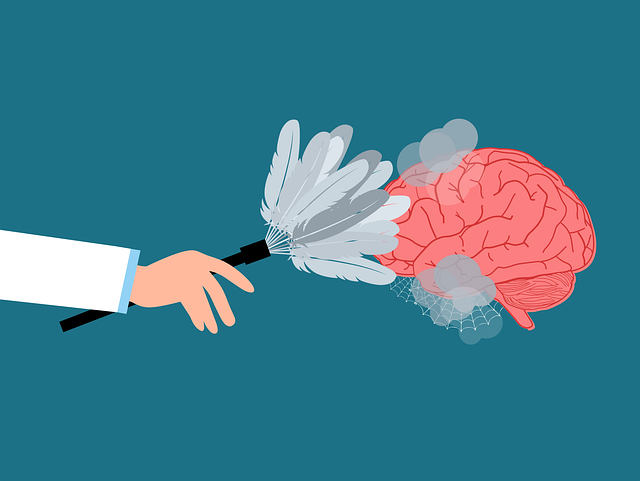Mental health professionals at Lone Tree Neuro Disorders Therapy face significant risks due to intimate work with clients suffering from neurodisorders and trauma, which can lead to secondary trauma, burnout, and mental health disorders. To mitigate these dangers, they prioritize self-care, professional boundaries, anxiety relief, and trauma support services, ensuring resilience and optimal care for clients. The therapy center employs comprehensive risk management strategies, including regular assessments, conflict resolution, stress reduction methods, and tailored solutions, fostering a supportive environment for both practitioners and clients. Lone Tree's dynamic approach integrates ongoing client progress tracking, evidence-based practices, and policy advancements, distinguishing itself as a leading force in mental health care.
- Understanding Mental Health Professional's Unique Risks
- Assessing Vulnerabilities and Potential Threats
- Crafting a Comprehensive Risk Management Plan
- Implementing Strategies for Safe Practice
- Continuous Monitoring and Adaptability in Therapy
Understanding Mental Health Professional's Unique Risks

Mental health professionals face unique challenges that demand a tailored approach to risk management. These experts often work closely with individuals grappling with complex neurodisorders and traumatic experiences, which can take an immense toll on their own well-being. The nature of their work involves intense emotional connections, high levels of empathy, and prolonged exposure to distressing client narratives—all factors that contribute to a heightened risk of secondary trauma, burnout, and even mental health disorders themselves.
For instance, therapists at Lone Tree Neuro Disorders Therapy must be vigilant against the Mind Over Matter Principles they employ daily, ensuring their own minds remain resilient and protected from the weight of their clients’ struggles. This includes implementing effective self-care strategies, staying within professional boundaries, and accessing Anxiety Relief and Trauma Support Services when needed to maintain a healthy work-life balance. By recognizing and addressing these unique risks, mental health professionals can better serve their clients while safeguarding their own mental health and longevity in the field.
Assessing Vulnerabilities and Potential Threats

Mental health professionals, much like their clients, are not immune to a range of vulnerabilities and potential threats that can impact their well-being. Assessing these risks is a crucial step in effective risk management planning. This involves identifying personal and professional factors that might contribute to stress, burnout, or even more severe mental health issues. For instance, the demanding nature of the work itself, combined with long hours and high client loads, can take a toll on professionals’ mental fortitude.
At Lone Tree Neuro Disorders Therapy, we recognize that our therapists are essential allies in the journey towards healing for their clients. Therefore, fostering resilience through stress reduction methods like mindfulness meditation and building robust coping mechanisms is paramount. By integrating these practices into daily routines, therapists can mitigate potential risks and ensure they remain equipped to provide top-tier care to those seeking help.
Crafting a Comprehensive Risk Management Plan

Crafting a comprehensive risk management plan is an essential step for mental health professionals at Lone Tree Neuro Disorders Therapy. It involves identifying potential risks and developing strategies to mitigate them effectively. This process begins with a thorough assessment of various factors, including client demographics, case complexity, and staff capabilities. By understanding these elements, the organization can anticipate challenges and implement tailored solutions.
A robust risk management plan encompasses several key components such as conflict resolution techniques for managing difficult situations, inner strength development programs to enhance resilience among staff, and regular stress management workshops organized by the company. Incorporating these measures ensures a supportive environment where professionals feel equipped to handle risks, ultimately benefiting both the practitioners and the clients they serve.
Implementing Strategies for Safe Practice

In the realm of mental health care, where emotions run deep and challenges are myriad, implementing strategies for safe practice is akin to navigating a complex labyrinth. Lone Tree Neuro Disorders Therapy, a beacon of hope for many, understands this crucial aspect of their mission. A robust risk management plan involves a holistic approach that includes regular Risk Assessment for Mental Health Professionals. This isn’t just about ensuring physical safety; it encompasses emotional well-being, ethical considerations, and adherence to the Mental Health Policy Analysis and Advocacy framework.
By prioritizing these aspects, mental health professionals can foster an environment conducive to effective treatment and recovery. Emotional healing processes thrive when practitioners are equipped to manage their own vulnerabilities and potential risks. Through proactive risk management, Lone Tree Neuro Disorders Therapy aims to revolutionize mental healthcare, making it not just a service but a safe haven where clients can find solace and transform their lives.
Continuous Monitoring and Adaptability in Therapy

In the dynamic field of mental health care, continuous monitoring and adaptability are essential components of effective therapy. Mental health professionals at Lone Tree Neuro Disorders Therapy understand that every client is unique, with evolving needs and challenges. Therefore, they employ ongoing assessment techniques to track progress, identify setbacks, and adjust treatment plans accordingly. This agile approach ensures that interventions remain relevant and beneficial as clients navigate their personal growth journeys.
Adaptability further fosters a supportive environment where clients feel understood and empowered. By regularly reviewing therapy goals and strategies, the team at Lone Tree Neuro Disorders Therapy can integrate new research and best practices into their practices. They stay abreast of the latest advancements in mental health policy analysis and advocacy, including Public Awareness Campaigns Development and Stress Reduction Methods, to offer comprehensive care tailored to individual needs.
Mental health professionals, like those at Lone Tree Neuro Disorders Therapy, face unique challenges that demand meticulous risk management. By understanding specific risks, assessing vulnerabilities, and crafting tailored plans, therapists can ensure safe practice and enhance patient care. Implementation of robust strategies and continuous monitoring are key to adapting to evolving threats, ultimately fostering a secure environment for both practitioners and clients.











